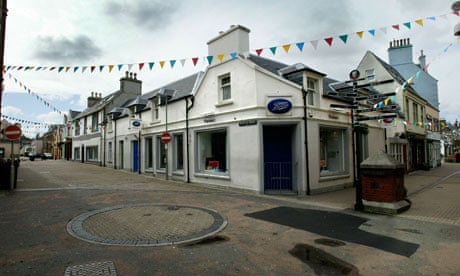Councillors on the Western Isles could be forced to abandon a centuries-old religious tradition of keeping sports and community centres closed on a Sunday because it breaches new equality legislation, the Guardian has learned.
The islands of Lewis, Harris and North Uist are the last places in the UK where publicly owned and lottery-funded facilities suchas leisure centres, golf courses, school grounds and community halls are closed because of sabbatarianism, which bans work and play on Sundays on religious grounds.
The tradition, promoted vigorously by the staunchly protestant Free Church and the Church of Scotland, has caused deep divisions on the islands and bitter rows between pro-opening campaigners and senior figures in the church and council.
Sabbatarian campaigners are also fighting proposals to allow a ferry sailing on Sundays between Uist and Harris, despite losing earlier campaigns to stop Sunday ferries and flights to Stornoway from the mainland.
In recent weeks the council lost a significant legal battle after a sheriff ruled that its licensing committee had broken the law by refusing to give Stornoway golf club a Sunday drinking licence. The committee had come under intense pressure from protestant churches.
The club opened its bar for the first time on a Sunday earlier this month, hosting a meeting by campaigners fighting for Stornoway leisure centre to be opened seven days a week. The club is now planning to again ask its landlord, the Stornoway trust, to allow golf to be played on the sabbath. The trust has repeatedly refused to do so.
Investigations by the Guardian have also uncovered incidents in which the council has allowed church groups to use council-owned minibuses and Stornoway town hall on a Sunday, while denying the same services to non-religious groups. Legal experts say this opens the council up to legal action under the Equality Act: at the same time the council allows identical public facilities on the southern islands of Barra and South Uist to open every day because they are Catholic and do not observe sabbatarianism.
Using freedom of information requests, the Guardian has established that the lottery-funded agency Sportscotland has spent more than £4m on public and private facilities in the Western Isles, including a swimming pool, football pitches, sports halls and golf clubhouses, knowing they were closed on Sundays.
But in a crucial development for the pro-Sunday opening lobby, the Equality and Human Rights Commission has warned the council that its policies could breach a new public sector duty on all local authorities "to have due regard to the need to eliminate discrimination and foster good relations". This duty comes into effect in April.
In its first public statement on the controversy, the commission said: "Where a public body is aware that concerns have already been raised about the effect of certain policies or practices on certain groups, the commission's guidance indicates that an assessment of the impact of that policy is given priority. Public bodies may want to examine different ways in which a service could be delivered which would eliminate discrimination by consulting with those that use their services.
"This will ensure that the body is meeting their legal obligations as well as ensuring their policies are fair."
The council admitted it would be affected, but claimed that would only be the case if its policies changed. "Obviously the comhairle [Gaelic for council] carefully examines all new legislation and will continue to comply with its legal obligations after the new legislation in April.
"We fully agree with EHRC that should there be a change in policy or if it is reviewed, we would be obliged to carry out an equality impact assessment – as is the case with any policy changes."
The commission's decision was applauded by Helen Macleod, who is leading a campaign to open Stornoway leisure centre on a Sunday.
She said there were 300 families who wanted to swim on Sundays, but their pleas were being ignored by the council. Opening the centre every day of the week would increase its income, at a time of cuts in government funding.
"We believe it is negligent not even to give Sunday opening a trial period to see if it works," she said.
The Reverend Dr Iain Campbell, chairman of the local branch of the Lord's Day Observance Society/Day One, said it wanted to promote the sabbath "as something positive and something which has served the island well – it has given a robustness to family life and community life. I'm convinced our special Sunday has strengthened our community life."
